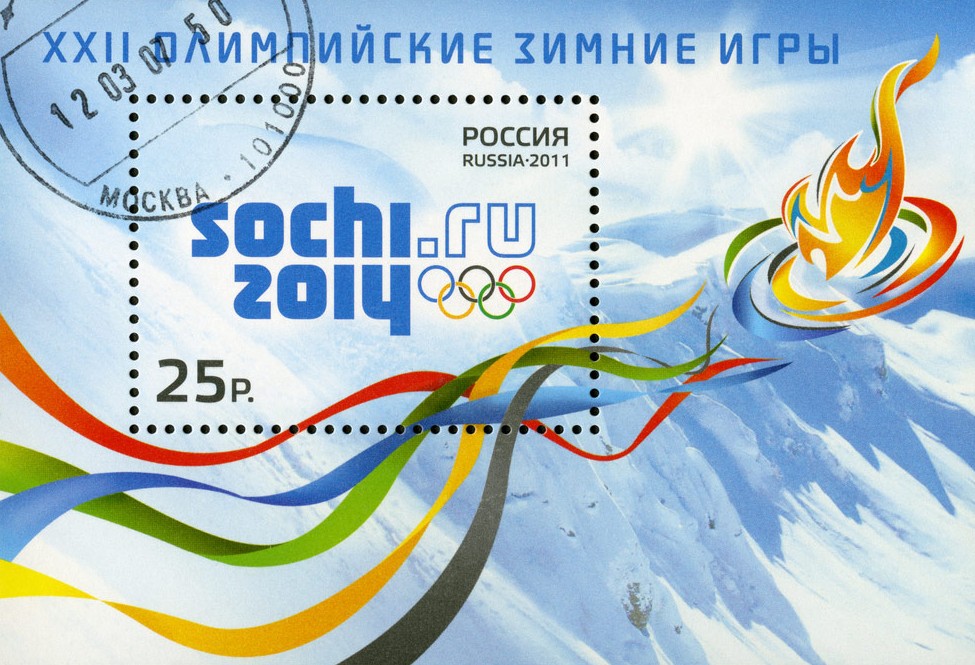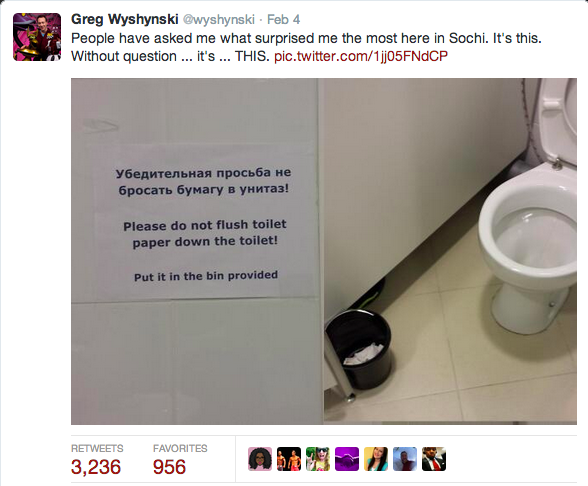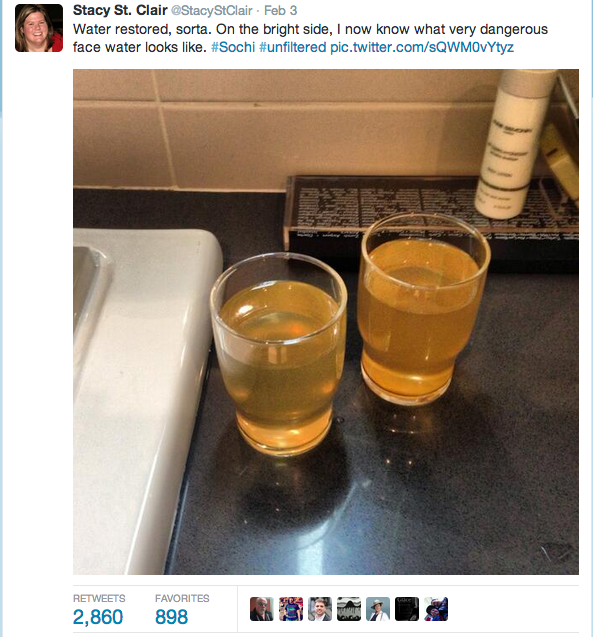Top CNN sports anchor Amanda Davies tweeted last week as she departed for the 2014 Winter Olympics: “I’m Sochi bound . . . but I admit, I’m a bit scared.”
One of her followers responded that same day: “U should be.”
Few Olympic games have opened under such a cloud of mystery and intrigue. There is an air of apprehension as journalists gather to cover Russia’s $51 billion extravaganza on the Black Sea. For weeks, media reports leading up to the Feb. 7 opening ceremonies have set a chilling tone.
There have been stories about “black widow” suicide bombers seeking revenge, Islamic extremist groups threatening attack and demonstrations protesting Russia’s anti-gay stance (despite government bans on such gatherings.) The terrorist breeding grounds of Dagestan and Chechnya are just a short flight away.
Yet as thousands of media professionals descend on Sochi to report on the Olympics, which opens tomorrow and runs through Feb. 23, the concerns journalists have been writing and tweeting about so far seem to be more about day-to-day survival — finding a bed to sleep in, toilets that work and Internet hookups to file their stories.
The Russians built nine upscale, high-rise hotels to house the press corps, but by check-in time this week, only six were ready. The rest were a work in progress.
Other hotels in the town were jammed, leaving reporters like Amanda Davies to fend for themselves. On Feb. 4, she tweeted: “hotel chaos. 8pm on day 2 in Sochi… Still only 2 hotel rooms out of 11 booked. Tonight we don’t know where we’re staying.”
Complaints about lost hotel reservations, unfinished, filthy rooms, malfunctioning elevators, toilets that don’t flush, cafeterias sans food and faulty electricity by far have trumped concerns about terrorism, at least in the first flurry of tweets emanating out of Sochi.
Bruce Arthur, sports reporter for Canada’s National Post, chronicled the chaos journalists faced when they attempted to check into hotels — everything from “water that looked like cloudy urine” to soiled bed sheets and a bathtub that sprung loose from the wall and “therefore rocks like a ship.”
“Almost every room is missing something: light bulbs, TVs, lamps, chairs, curtains WiFi, heat, hot water,” Arthur wrote in the National Post on Feb. 4.
He reported that Joerg Reuter, a photographer for the European Pressphoto Agency, found “the first room offered to him full of construction debris, with yellow-brown water and appliances that didn’t work.” Three rooms later, he finally found one that was suitable.
Although it is “a bit of a mess,” Arthur wrote, “Most journalists are laughing when they can, and as Bonnie D. Ford of ESPN.com put it, at least it keeps your mind off the whole potential terrorism thing.”
The use of electronic devices has been a challenge. When the Guardian’s Shaun Walker arrived at the hotel, he found his room still under construction. A receptionist informed him, “They are literally finishing, the keys are literally coming now.” When reporters requested a password for WiFi to file stories, the same receptionist responded, “We have plans for the introduction of WiFi in the rooms in the foreseeable future.”
Shoddy bathrooms and water quality seem to be drawing the most complaints.
Greg Wyshynski, editor of the Puck Daddy blog on Yahoo! Sports, was among those with concerns about the facilities in Sochi.
- screenshot from Puck Daddy Blog editor Greg Wyshynski’s Twitter account.
The Chicago Tribune’s Stacy St. Clair tweeted, “My hotel has no water. If restored, the front desk says, `do not use on your face because it contains something very dangerous.”
One reporter messaged his mother to send shower curtains, a rare commodity in some hotels.
Some journalists made light of doorknobs falling off in their hands and construction workers asleep on the job.
Others took aim at Russian President Vladimir Putin and the International Olympic Committee for not living up to promises.
USA Today columnist and veteran Olympic reporter Christine Brennan posted a series of scathing tweets about the poor housing conditions.
“Bottom line: this is an embarrassment for Sochi, Putin and IOC. Totally unacceptable with 7 yrs to plan, build. Ridiculous, unprecedented,” she wrote on Feb. 4. Before heading to bed that night, Brennan added: “IOC needs to answer for this. So does Putin. Let the games begin.”
Olympic officials don’t appear to be all that concerned about the housing issues. The Washington Post reported this week that IOC President Thomas Bach insisted “the stage is ready” and that concerns about safety and construction have been “overblown.”
Pre-Olympics media coverage foreshadowed the difficulties to come.
On Feb. 1, the Associated Press reported only six of Sochi’s nine media hotels were ready. The construction debacle has been an embarrassment for local planners. Stories documented the slow, shoddy construction work and frenzied rush to the finish line.
A Feb. 3 New York Times story called Sochi “a work in progress.”
“So far, the inconveniences have mostly affected the news media, perhaps the least sympathetic of the participants here,” David Segal wrote in the Times. But what happens when the parents of athletes get a no-hot-water treatment or their hotel rooms are not ready? “There is some trepidation among Olympic officials that outrage will flow,” he reported.
Despite the glitches, journalists are finding a soft spot for Sochi, described in travel guides as “The pearl of the Russian Riviera,” a coastal playground that dates back to ancient Greek and Roman times and has long been where the Russian elite gather to go sailing, sunning and white-water rafting in nearby waterways. Joseph Stalin was so fond of the Black Sea region he built a vacation home, or dacha, in Sochi.
Photos of the stunning Caucasus Mountains that surround Sochi are showing up on Instagram along with newly built towering hotels and Olympic displays that blanket the town of around 400,000.
Journalists describe smiling volunteers who greet them at the airport and locals taking the time to give them directions to a grocery store or best place in town to buy vodka.
A Feb. 3 New York Times story described “transportation hubs with spiffy trains and shiny buses” and an Olympic park where sporting venues look “reassuringly ready.”
Jodi Bacon, a producer for KHTK Sports Radio in Sacramento, tweeted, “I’m reading all these crazy stories about Sochi. I’m happy to say, my trip has been smooth and without a hitch.” Before heading to bed on Feb. 4, she wrote, “I’ll snap some pics tomorrow of the beauty I’m witnessing here. My trip has been SAFE and FINE.”
CNN’s Amanda Davies also was in a good mood at bedtime that night. Davies had been tweeting about the chaos the CNN crew experienced during check in at their hotel. Then, this: “We have rooms!! And keys! And beds! 11 of them! Hurrah. See you tomorrow team! Zzzzzzzzzzzzz”
If the 2014 Winter Olympic games come off without a hitch and succeed in showcasing Putin’s Russia in glorious form, accounts of stalled elevators, odorous toilets and yellow tap water will soon be a passing phase. As the New York Times’ David Segal reported, “Sochi is cutting it close.”
Sherry Ricchiardi, Ph.D., is a senior writer for AJR, specializing in international issues and professor emeritus in journalism at Indiana University. Ricchiardi has conducted media training in developing countries throughout the world for the International Center for Journalists and as part of the U.S. Department of State’s speaker program. Before going into media development, she spent 14 years at the Des Moines Register as an investigative reporter and Sunday magazine writer. She later became city editor for the Columbia Missourian, a newspaper produced at the University of Missouri School of Journalism, her alma mater. In 2003 and 2009, she won the National Press Club’s top awards for press criticism for stories published in AJR.












Leave a Comment